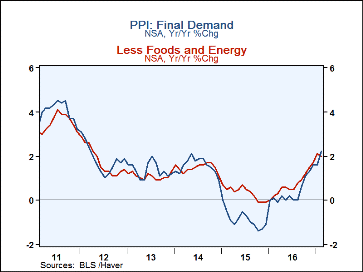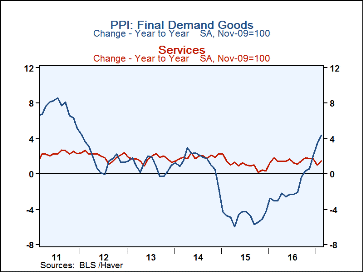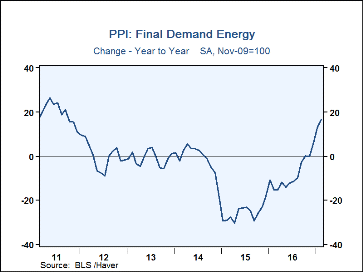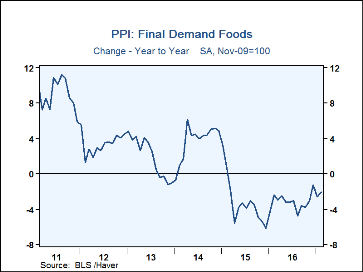 Global| Mar 14 2017
Global| Mar 14 2017U.S. Producer Prices Continue to Strengthen
by:Tom Moeller
|in:Economy in Brief
Summary
The headline Final Demand Producer Price Index increased 0.3% during February after a 0.6% January rise. The y/y increase of 2.2% was the strongest since March 2012. The monthly gain exceeded expectations for a 0.1% uptick in the [...]
The headline Final Demand Producer Price Index increased 0.3% during February after a 0.6% January rise. The y/y increase of 2.2% was the strongest since March 2012. The monthly gain exceeded expectations for a 0.1% uptick in the Action Economics Forecast Survey. The PPI excluding food and energy rose 0.3% (1.5% y/y) following a 0.4% increase. A 0.2% rise had been expected.
Prices of trade services strengthened 0.4% following a 0.9% January rise. An updated measure of "core" PPI inflation, final demand prices excluding food, energy, and trade services prices, increased 0.3% (1.8% y/y) following a 0.2% January gain.
Final demand goods prices improved 0.3% (1.8% y/y). Final demand energy prices increased 0.6% (19.2% y/y) as gasoline prices eased 2.5% (+47.5% y/y). Home heating oil prices were little changed (+72.4% y/y) while natural gas prices nudged 0.3% higher (3.8% y/y). Food prices improved 0.3% (-1.8% y/y). Beef & veal prices declined 3.7% (-12.8% y/y) while fruit & melon prices increased 0.7% (-10.2% y/y). Egg prices fell 13.5% (-49.2% y/y), but bakery product prices gained 0.2% (0.1% y/y). Pork prices increased 0.7% (3.6% y/y), and dairy product prices remained unchanged (5.2% y/y).
Nondurable consumer goods prices excluding food & energy improved 0.1% (3.2% y/y). The y/y increase has lost momentum since a 4.1% y/y rise in June 2015. Finished consumer durable goods prices eased 0.1% (0.9% y/y) for the third month in the last four. Private capital goods prices also slipped 0.1%. Here again, the 0.7% y/y increase was below the 1.5% high in mid-2014.
Prices of final demand for services improved 0.4% (1.4% y/y) following a 0.3% rise. Trade services prices increased 0.4% (0.9% y/y) following a 0.9% January increase. Prices for transportation of private passengers held steady (2.5% y/y) after a 3.6% jump, while transportation & warehousing costs increased 0.3% (1.1% y/y).
Final demand construction costs eased 0.1% (+1.2% y/y) following a 0.3% increase.
Prices of processed goods for intermediate demand improved 0.4%. The 5.0% y/y gain compared to 6.6% price deflation during 2015. It was the strongest y/y increase since 2011.
The PPI data are contained in Haver's USECON database with further detail in PPI and PPIR. The expectations figures are available in the AS1REPNA database.
Deficit Reduction and Choices for the Future from the Congressional Budget Office can be found here.
| Producer Price Index (SA, %) | Feb | Jan | Dec | Feb Y/Y | 2016 | 2015 | 2014 |
|---|---|---|---|---|---|---|---|
| Final Demand | 0.3 | 0.6 | 0.2 | 2.2 | 0.5 | -1.0 | 1.8 |
| Excluding Food & Energy | 0.3 | 0.4 | 0.1 | 1.5 | 1.3 | 0.8 | 1.8 |
| Excluding Food, Energy & Trade Services | 0.3 | 0.2 | 0.1 | 1.8 | 1.2 | 0.6 | 1.2 |
| Goods | 0.3 | 1.0 | 0.6 | 3.9 | -1.5 | -4.9 | 1.4 |
| Foods | 0.3 | 0.0 | 0.5 | -1.8 | -3.2 | - 3.1 | 3.7 |
| Energy | 0.6 | 4.7 | 1.8 | 19.2 | -8.2 | -25.6 | -3.2 |
| Goods Excluding Food & Energy | 0.1 | 0.4 | 0.3 | 2.0 | 0.8 | 0.4 | 1.6 |
| Services | 0.4 | 0.3 | 0.1 | 1.4 | 1.5 | 1.0 | 1.9 |
| Trade Services | 0.4 | 0.9 | 0.0 | 0.9 | 1.5 | 1.4 | 2.0 |
| Construction | -0.1 | 0.3 | -0.1 | 1.2 | 1.3 | 3.2 | 1.9 |
| Intermediate Demand - Processed Goods | 0.4 | 1.1 | 0.4 | 5.0 | -5.7 | -14.0 | 1.1 |
Tom Moeller
AuthorMore in Author Profile »Prior to joining Haver Analytics in 2000, Mr. Moeller worked as the Economist at Chancellor Capital Management from 1985 to 1999. There, he developed comprehensive economic forecasts and interpreted economic data for equity and fixed income portfolio managers. Also at Chancellor, Mr. Moeller worked as an equity analyst and was responsible for researching and rating companies in the economically sensitive automobile and housing industries for investment in Chancellor’s equity portfolio. Prior to joining Chancellor, Mr. Moeller was an Economist at Citibank from 1979 to 1984. He also analyzed pricing behavior in the metals industry for the Council on Wage and Price Stability in Washington, D.C. In 1999, Mr. Moeller received the award for most accurate forecast from the Forecasters' Club of New York. From 1990 to 1992 he was President of the New York Association for Business Economists. Mr. Moeller earned an M.B.A. in Finance from Fordham University, where he graduated in 1987. He holds a Bachelor of Arts in Economics from George Washington University.
More Economy in Brief
 Global| Feb 05 2026
Global| Feb 05 2026Charts of the Week: Balanced Policy, Resilient Data and AI Narratives
by:Andrew Cates










